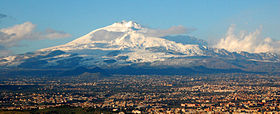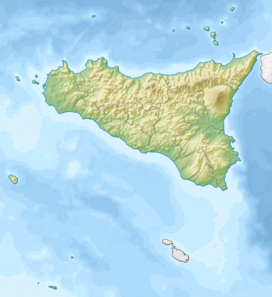Mount Etna
| Mount Etna | |
|---|---|

Etna with the city of Catania in the foreground
|
|
| Highest point | |
| Elevation | 3,329 m (10,922 ft) , (varies) |
| Prominence | 3,329 m (10,922 ft) Ranked 59th |
| Isolation | 999 kilometres (621 mi) |
| Listing | Ultra |
| Coordinates | 37°45.3′N 14°59.7′E / 37.7550°N 14.9950°ECoordinates: 37°45.3′N 14°59.7′E / 37.7550°N 14.9950°E |
| Geography | |
|
|
|
| Geology | |
| Age of rock | 350,000 - 500,000 years |
| Mountain type | Stratovolcano |
| Last eruption | 1 March 2017 |
|
UNESCO World Heritage Site
Mount Etna |
|
| Name as inscribed on the World Heritage List | |
| Location | Italy |
| Type | Natural |
| Criteria | vii, viii, ix |
| Reference | 1427 |
| UNESCO region | Europe |
| Inscription history | |
| Inscription | 2013 (37th Session) |
Mount Etna (or Etna; pronunciation: /ˈɛtnə/; Italian: Etna [ˈɛtna] or Mongibello [mondʒiˈbɛllo], Sicilian: Mungibeddu [mʊndʒɪbˈbɛɖɖʊ] or â Muntagna, Latin: Aetna) is an active stratovolcano on the east coast of Sicily, Italy, in the Metropolitan City of Catania, between the cities of Messina and Catania. It lies above the convergent plate margin between the African Plate and the Eurasian Plate. It is the tallest active volcano in Europe, currently 3,329 m (10,922 ft) high, though this varies with summit eruptions. It is the highest peak in Italy south of the Alps. Etna covers an area of 1,190 km2 (459 sq mi) with a basal circumference of 140 km. This makes it by far the largest of the three active volcanoes in Italy, being about two and a half times the height of the next largest, Mount Vesuvius. Only Mount Teide in Tenerife (owned by Spain) surpasses it in the whole of the European–North-African region. In Greek Mythology, the deadly monster Typhon was trapped under this mountain by Zeus, the god of the sky and thunder and king of gods, and the forges of Hephaestus were said to also be located underneath it.
...
Wikipedia

